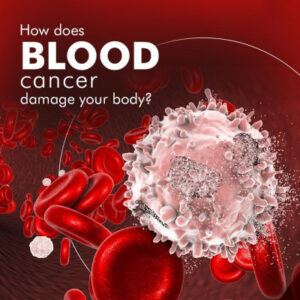Introduction
Hematologic malignancies, often known as blood cancers in the scientific realm, encompass a wide range of disorders affecting the blood, bone marrow, and lymphatic system. These disorders are distinguished by the relentless proliferation of anomalous blood cells, leading to disturbances in the body’s customary blood generation and immune defenses. Within this discourse, we embark on a comprehensive journey through the realm of blood cancer, uncovering its myriad classifications, associated risk elements, and the forefront strides in therapeutic interventions.
Types of Blood Cancer
Blood cancer encompasses several distinct types, each with its unique characteristics. The primary categories include
Leukemia
Categorized by the pace of abnormal cell proliferation, leukemia, an ailment originating in the bone marrow disrupting normal white blood cell production, branches into acute or chronic forms.
Lymphoma
Lymphoma, a condition rooted in anomalies within the lymphatic system, disrupts the vital functions of lymphocytes, a unique subset of white blood cells, and divides into two primary classifications: Hodgkin’s lymphoma and non-Hodgkin’s lymphoma.
Multiple Myeloma
Multiple myeloma primarily affects plasma cells in the bone marrow, causing the production of abnormal antibodies. It can weaken bones and compromise the immune system.
Myelodysplastic Syndromes (MDS)
MDS is a group of disorders that impairs the production of healthy blood cells, leading to anemia and increased susceptibility to infections.
Risk Factors:
While the exact causes of blood cancer remain elusive, several risk factors have been identified
Genetic Predisposition: Certainly, here’s a unique line for you: Certain people may carry inherited genetic variations that heighten their vulnerability to blood cancer.
Age
The propensity for blood cancer to manifest rises significantly with advancing age, often becoming most prevalent among individuals surpassing the age of 60.
Radiation and Chemical Exposure
Extended contact with ionizing radiation or specific chemicals like benzene has been associated with an elevated susceptibility.
Immune System Disorders
Conditions that weaken the immune system, like HIV/AIDS, can elevate the risk of blood cancer.
Family History
A family history of blood cancer may raise an individual’s risk.
Advances in Treatment
Significant progress has been made in the treatment of blood cancer over the years, offering improved outcomes for many patients. Treatment approaches may include
Chemotherapy
Chemotherapy agents are precision-engineered to singularly seek out and annihilate malignant cells, executing their mission through either instigating cell demise or obstructing their uncontrolled replication.
Radiation Therapy
High-energy rays are directed at cancer cells to destroy them or prevent their growth.
Targeted Therapy
Tailored medications are meticulously crafted to assail precise molecular targets implicated in the proliferation of cancerous cells.
Immunotherapy
Utilizing the innate power of the body’s immune system, this strategy directs its formidable prowess towards identifying and eradicating cancerous cells with remarkable precision.
Stem Cell Transplantation
Stem cells offer the remarkable ability to replace damaged or depleted bone marrow with rejuvenating and healthy cellular counterparts, paving the way for transformative medical treatments.
Precision Medicine
Tailoring treatments based on the individual genetic makeup of the patient.
Conclusion
Blood cancer continues to pose significant medical challenges, yet the relentless pursuit of research and evolving treatment methods ignite a beacon of hope, promising enhanced outcomes and an enhanced quality of life for those touched by this condition.
Early detection and prompt medical intervention are crucial in managing blood cancer effectively. By raising awareness and supporting continued research, we can strive towards a future where blood cancer is a manageable disease, and ultimately, a curable one.
Read More:- Calendula Flower: A Flowing Plant Aiding In Restoring Skin Health!
Read More:-Exploring the Multifaceted World of Tea: Unearthing Its Unexpected Effects



